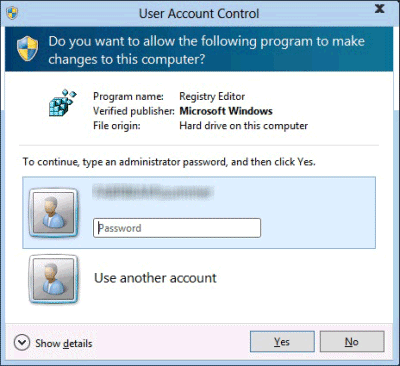In today’s post, we will address by outlining the possible cause and then provide the corresponding workaround for the following issue; “File system error” that you might encounter when you try to copy, and then paste a password into the UAC credential dialog box in Windows 11/10.

File system error in Credential dialog box
Let’s say you try to start an application by using elevated permissions. For example, you right-click cmd.exe and select Run as administrator. A User Account Control (UAC) dialog box prompts you for your user name and password. You copy the password from a source and press Ctrl+V key combo to paste in the password and then you receive the following error messages:
This program does not have a program associated with it for performing this action. File System Error (-1073741189).
1073741189 indicates 1that if the UAC or User Account Control Settings’ Registry Values are changed or the System Files are corrupt, this File System Error might occur.
Additionally, If you right-click the password field, a shortcut context menu where you can select Paste does not appear.
You investigate and notice that Consent.exe crashes when the issue occurs.
Consent.exe is a file that launches the user interface for the User Account Control (UAC), an authorization layer for Windows. This is a genuine and safe process.
The File system error maps to the following information in the table below:
| Code | Symbolic Name | Error Description | Header | |
| Hex | Dec | |||
| 0xc000027b | -1073741189 | STATUS_STOWED_EXCEPTION |
An application-internal exception has occurred. |
ntstatus.h |
Possible cause of the credential dialog box ‘File system error’
Pasting the contents of the clipboard into a secure input box is intentionally blocked in Windows. However, the Consent.exe crash is a software problem.
Windows introduces a security change that blocks clipboard access from the Winlogon desktop (also known as the Secure Desktop). This change prevents unauthorized users from seeing information on the clipboard. For example:
- Authorized user A copies some information to the clipboard and then locks the computer.
- Unauthorized user B wakes up the computer (which is at the lock screen) and starts Narrator > Narrator Help. From there, unauthorized user B can paste the clipboard contents into a text box in Narrator Help and then read the clipboard content.
A side effect of this change is that, by default, information can no longer be pasted into the password text box for UAC elevation.
The reason why UAC prompts are displayed by default on the Winlogon desktop is so that no nonsecure process (for example, one that is not already running as SYSTEM) can spy on passwords or other information that is input into the UAC dialog box.
How to fix Credential dialog box “File system error”
As prescribed by Microsoft, to fix the consent.exe crashing issue, install the latest Windows Updates.
However, the CU only fixes the consent.exe crashing issue. Pasting password to secure the input box is still blocked.
If you want to be able to paste the password into the UAC credential dialog box without receiving the File system error, Microsoft offers the following workaround:
To work around this issue, use gpedit.msc to configure the UAC elevation prompt to display on the standard user desktop instead of on the Winlogon desktop. As soon as the password is copied and on the clipboard on the standard user desktop, any process that is running in that desktop can read that data in plain text. In effect, the potential security breach has already occurred with no need for any process to try to read the password information from a UAC dialog box.
Microsoft has verified that the security fix that is implemented in Windows 10 to enforce the correct security boundary from the standard desktop to the Winlogon desktop is the desired behavior, and this will likely remain the behavior in future versions of Windows.
I hope you find this post helpful and informative enough!
Leave a Reply